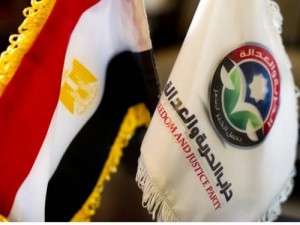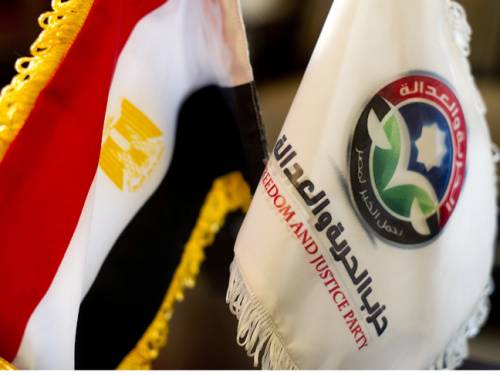
AFP Photo
Although new parliamentary elections have not been scheduled yet, political parties are scrambling to form electoral alliances in a bid to get the most seats possible and increase their share from the last parliament.
The Muslim Brotherhood’s Freedom and Justice Party will not be running under its Democratic Alliance for Egypt that included liberal and leftist parties and contested the 2011 elections.
The Alliance is all but gone due to the new political realities in Egypt. It was composed of the FJP which dominated its lists, alongside the Nasserist Karama Party, led by former presidential candidate Hamdeen Sabahi, the liberal Ghad Al-Thawra lead by former presidential candidate Ayman Nour, as well as the moderate Islamist Civilisation Party.
Sabahi and Nour both ran in presidential elections against the Brotherhood’s candidate and Sabahi is now seen as a leader of the “third current” that opposes both the former regime and the Brotherhood. Their parties are unlikely to ally with the Brotherhood again.
The Civilisation Party will also not ally with the Brotherhood, preferring to join a more moderate Islamist coalition led by the Wasat Party and former presidential candidate Abdel-Moniem Aboul-Fotouh.
The FJP will instead focus on allying with more Islamist parties, although it will also talk to parties from outside that current.
FJP media officer Ahmed Rabie told the Daily News Egypt that talk of electoral aliances was too early and has not been discussed within the party yet. He did, however, say that the presidential elections revealed a new political compass that would shape any alliances in the future.
The Salafist Nour Party has refuted rumours that it would not join an alliance led by the FJP.
The party is disappointed with the FJP for not keeping many of its promises, specifically the amount of cabinet seats offered to the Nour Party, even though the party backed President Mohamed Morsy, the FJP nominee, in the second round of the presidential race, but party spokesperson Yousry Hammad told the Daily News Egypt that would not stop the party from allying with the FJP.
“We have our opinion regarding the formation of the cabinet which we have made public, but that does not mean we cannot cooperate with the FJP on other matters,” he said.
“The party has a certain ideology and as such is not opposed to forming electoral alliances with others as long as they share that ideology,” he added.
According to Hammad, the issue of electoral alliances of parliamentary elections in general had not been discussed within the party’s high board yet as it was too early.
The party, which led a coalition of conservative Islamist parties in the last election, is in fact more likely to contest the upcoming vote on its own according to statements made by party leader Younes Mekhion to the state-owned Akhbar Al-Youm newspaper on Saturday.
Hammad refused to rule out the idea of electoral alliances, however.
In opposition to the Muslim Brotherhood and Salafist parties last year was the Egyptian Bloc, a coalition of liberal and leftist parties that formed the largest opposition front inside parliament despite not having a large number of seats.
It was formed of the liberal Free Egyptian Party, which is concerned with economic liberalism; the Egyptian Social Democratic Party, which adopts a socially liberal, economically leftist, ideology; and the left wing National Progressive Unionist Party (Taggamu) Party.
The ESDP has since left the bloc, citing that it found the other members to be more concerned with the secularist-Islamist divide and less with the former regime-revolution one which led it to support former regime officials over Islamists.
There are however parties and groups that are not divided alongside secular-Islamist lines, preferring to bridge the gap between both directions.
The “Moderate Current Coalition” is composed of the moderate Islamist Wasat Party, former moderate Islamist presidential candidate Abdel-Moniem, Aboul-Fotouh’s new Strong Egypt Party, the Egyptian Current Party which was formed by dissatisfied revolutionary youth who left the Muslim Brotherhood, the moderate Islamist Civilisation Party, the centrist Justice Party as well as the April 6 Youth and Masrina movements.
The coalition is not just an electoral alliance, however, but rather is a political one according to Wasat spokesperson Amr Farouk.
“We have formed a political alliance because electoral alliances usually don’t last as we have seen. The Nasserist Karama Party and the Muslim Brotherhood allied for example even though they have opposing ideologies,” Farouk told the Daily News Egypt.
He added that the Moderate Current Coalition was built on the basis of a political vision and not elections, and that it aimed to break the polarisation currently present on the political scene with the Muslim Brotherhood and more radical Islamists on one side and liberals and leftists on the other.
“Both choices do not represent the Egyptian people who are moderate, but in the previous elections all the moderate parties with the exception of Wasat were unknown which is why the results were so polarised,” he said.
The coalition aims to build political research centres and start awareness campaigns and development projects, not just contest elections, according to Farouk.
Members of the parties making up the coalition met on Saturday to draft a document stating the goals of the coalition, to be presented to all the parties on Monday.
But with the April 6 movement and the Egyptian Current Party both joining the coalition, there seems to be no alliances built on a revolutionary platform.
In the last elections revolutionary youth were represented by an unlikely alliance of Islamist, liberal and leftist parties and groups. The alliance, “The Revolution Continues” was able to maintain its unity but failed to garner more than two percent of the vote.
It was composed of the Coalition of Revolutionary Youth, which has since been disbanded, the Egyptian Current Party which has now joined the moderate coalition, the liberal Egypt Freedom Party led by former MP Amr Hamzawy, as well as the Socialist Popular Alliance Party and the Egyptian Socialist Party. The SPAP and the ESP have decided to merge into one socialist party.
These developments mean that most of the participants in the “Revolution Continues” alliance have either moved on to other coalitions or ceased to exist altogether, meaning the alliance is over.
Hope is not lost for revolutionary parties, however. The newly formed Dostour (constitution) Party led by Nobel laureate Mohamed El-Baradei says it aims to be a catch-all “big tent” party that serves to gather revolutionary youth from across the political spectrum. The party membership includes many prominent liberal, leftists and even Salafist figures.
The Egyptian Social Democratic Party is even now looking to join Dostour, either in a coalition or a full merger.




